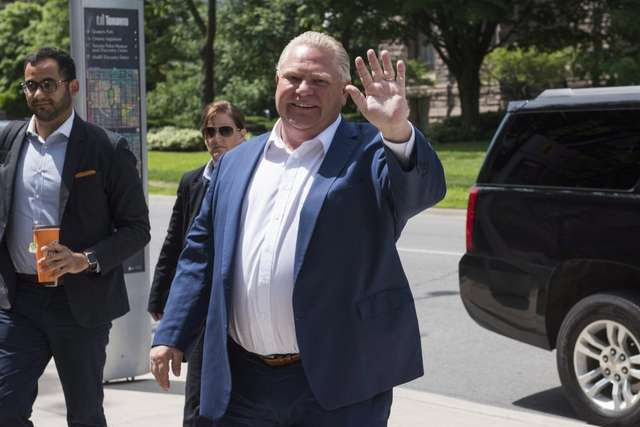Premier-designate Doug Ford takes office Friday with a new cabinet, a majority of the 124 newly-elected MPPs and a short but daunting to-do list.
The Tories provided that list when asked what Ontarians should expect.
NUMBER ONE: “Put more money in your pocket. Scrap the carbon tax, reduce gas prices by 10 cents per litre, and give real tax relief to lower- and middle-class families.”
Dan McTeague, of GasBuddy.Com, said consumers will definitely notice the drop in price at the pumps.
“An average family using 70 litres a week would save $350-plus (a year). For that same family that’s a week or two of groceries,” McTeague said. “Diesel prices, too, would drop as delivery of goods would be cheaper and allow us a better chance to compete with bordering U.S. state cost advantages …. and that’s just for starts.”
One of the key ways to reduce that price is eliminating the Kathleen Wynne government’s cap-and-trade program, a move that NDP MPP Gilles Bisson said will be anything but easy.
“Mark my words – what he is attempting to do with the cap-and-trade cancellation has the potential to be larger than the boondoggle we call the gas plants scandal,” he said. “You’ve got all kinds of people that have purchased credits in order to be able to compliant… and these people may sue… and I think there’s a potential that this thing could end up costing us far more money than he realizes.”
The end of the program also means the loss of about $2.5 billion in annual revenue and the green energy rebates that funded, he said.
Don Peat, a spokesman for Toronto Mayor John Tory, said he hopes the premier-designate realizes how important it is that cap-and-trade proceeds that had been earmarked to retrofit Toronto Community Housing buildings be replaced with funds from other provincial sources.
NUMBER TWO: “Clean up the hydro mess. Fire the $6-million man running Hydro One and lower your hydro bills by 12%.”
Firing Hydro One CEO Mayo Schmidtz without cause is expected to come with a $10.7-million penalty.
The reaction to Ford’s win has been muted from Hydro One.
“The board of directors, along with the leadership team at Hydro One, will continue to engage with our largest shareholder and discuss matters that are important to our customers and investors,” David F. Denison, chair of the board of Hydro One, said in an e-mail Saturday.
The Ontario government is its largest shareholder.
NUMBER THREE : “Create good jobs. Send the message that Ontario is ‘open for business’ and bring quality jobs back to Ontario by lowering taxes, stabilizing hydro bills and cutting job-killing red tape.”
Ford will be competing with U.S. President Donald Trump on this one, and the premier-designate is already trying to work any American connections to reverse aluminum and steel tariffs and prevent what is now just a threat, auto tariffs.
NUMBER FOUR: “Restore accountability and trust. Order a line-by-line audit of government spending to bring an end to the culture of waste and mismanagement in government.”
The City of Toronto budgeted $3.5 million to bring in outside auditors at former mayor Rob Ford’s request on a $10.6-billion operating budget in 2011.
Ford has said he and his brother saved the city $1 billion, although the city’s auditor general reported $16 million in savings conclusively linked to the service efficiency consultants.

NUMBER FIVE: “Cut hospital wait times. End hallway health care by creating 15,000 new long-term care beds over the next five years and adding $3.8 billion in new support for mental health, addictions and housing.”
While Ford hasn’t taken office yet, he already renewed negotiations with the province’s doctors and has Dr. Ruben Devlin, the former hospital CEO who oversaw the creation of the province’s first “digital hospital,” on his transition team, suggesting he is focused on modernizing and reforming the health-care system.
Natalie Mehra, executive director of the Ontario Health Coalition, said Ford’s commitment to long-term and mental-health care, while important, won’t end hallway medicine or shorten long waits for surgeries and tests.
The government must open more hospital beds — ICU beds, critical beds, acute care, surgical and chronic care beds – and fully staff operating rooms and ramp up MRIs, she said.
“Everyone else can afford it, so can we,” she said.


